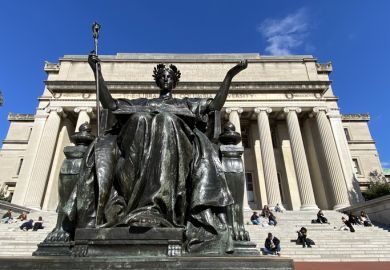All our EU Referendum results coverage in one place
Universities must fight back against the “pernicious anti-intellectualism” and distrust of experts that has marked the Brexit campaign, a vice-chancellor said.
Dominic Shellard, vice-chancellor of De Montfort University, said that there was a “lot of anxiety and stress” among students and staff on campus after the UK’s decision to leave the European Union, which he called a “grim day for Britain”.
Many academics were particularly worried that the Leave campaign’s tactics of dismissing economic experts who warned about the perils of a Brexit had apparently paid off, Professor Shellard told Times Higher Education.
“One of the main things about [UK Independence Party leader] Nigel Farage’s campaign was this pernicious brand of anti-intellectualism, where anyone who professed to be an expert was derided,” he said.
“As an institution where the accolade ‘expert’ is earned by painstaking years of study, we think people should be proud of that term,” he said.
Many university staff are now thinking about how to combat this emerging trend in national life, said Professor Shellard.
“Universities have a moral responsibility to challenge the notion that an intellectual or expert is someone who should be distrusted or denigrated,” he said.
“Universities must be the real leaders in the fightback against insularity."
The Leicester university was due to hold a meeting on 24 June for all staff and students to reassure them about how the historic referendum result would affect them, Professor Shellard said.
“We have to reassure international students, particularly those from the EU, about the result as nothing will happen very quickly,” he said.
“People are pretty bereft,” he added, not least by the “extent to which the country is riven from top to bottom, with London pitted against the northern shires, and Scotland against the South of England”.
The university would contact all non-UK applicants holding an offer to reassure them that their place was safe, he added.
“However, we are in limbo now and we all know the Leave campaign does not have any plans, just a slogan,” he added, saying that it “could not even answer basic questions such as ‘will EU students be able to get a loan?’”.
His comments were echoed by Steve West, vice-chancellor of the University of the West of England, who moved to reassure non-UK EU students, of whom nearly 30,000 undergraduates were admitted to UK universities last autumn.
Universities had been advised that there “will not be any immediate material change to the UK university sector’s participation in EU programmes such as Horizon 2020 and Erasmus+, nor to the immigration status of current and prospective EU students and staff”, he said.
The European University Association also called for institutions across the region not to sever their ties with UK universities, despite “formidable” consequences of the referendum decision.
“Regardless of the result of the referendum, British universities are and remain an essential part of the European family of universities, which extends beyond EU borders,” it said in a statement, adding the “Europe of universities will not be divided!”.
POSTSCRIPT:
Print headline: Universities must lead: v-c calls for fight against insularity and 'Brexit anti-intellectualism'
Register to continue
Why register?
- Registration is free and only takes a moment
- Once registered, you can read 3 articles a month
- Sign up for our newsletter
Subscribe
Or subscribe for unlimited access to:
- Unlimited access to news, views, insights & reviews
- Digital editions
- Digital access to THE’s university and college rankings analysis
Already registered or a current subscriber? Login







